Bret Baier Is Thriving in An Uncertain Trump Second Term: A Mediaite Q&A
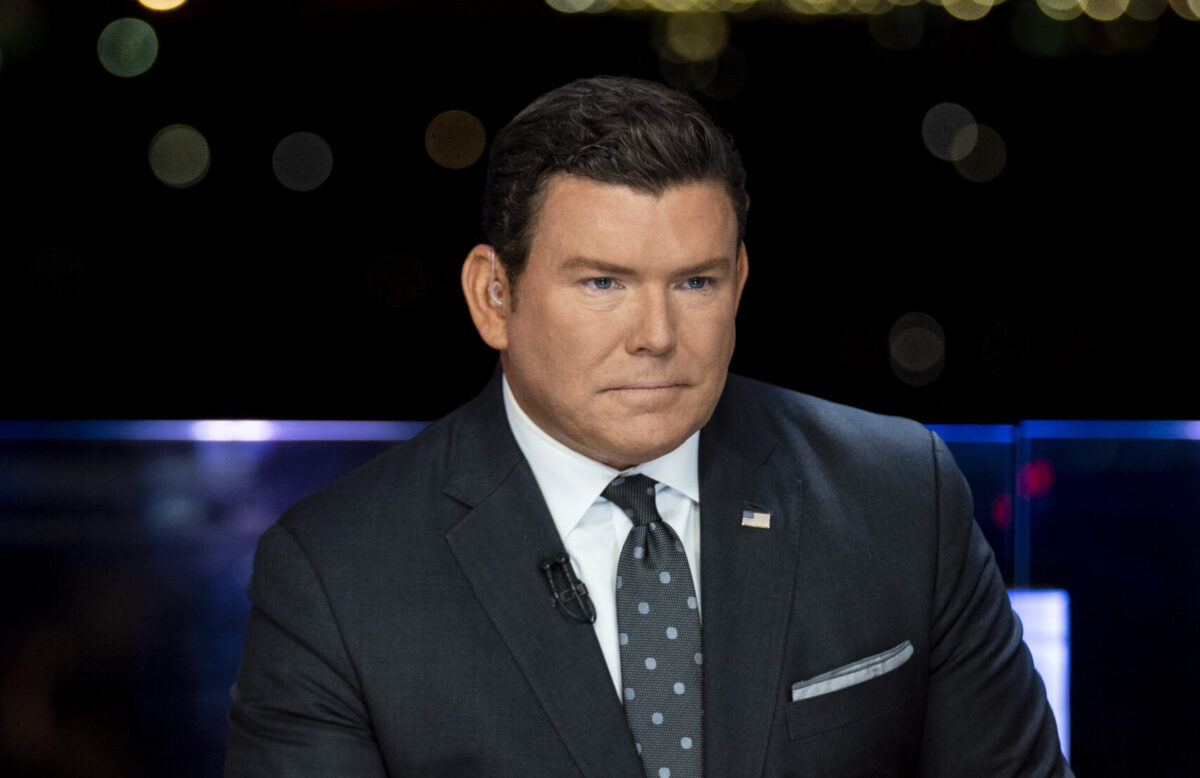
Bret Baier is having a moment.
As anchor of Special Report, Fox News’ flagship hard news program, Baier has become the living embodiment of the network’s journalistic credibility. In our hyper-partisan political media divide, that’s just another Rorschach test of its bona fides. But during an uncertain Trump second term that sees both cable and broadcast networks back on their heels, Baier is absolutely cruising.
Fox News, of course, is entirely dominant in this uncertain era. Not only does the network crush the cable news competition, but this summer, it has been first in all of television in prime time. That’s thanks mostly to Fox’s stable of pro-Trump opinion programming, but Special Report, the network’s flagship news program airing at 6 p.m., is thriving on its own terms. In July, Baier’s show beat CBS Evening News in 19 major markets — including Atlanta, Dallas, Philadelphia, and, of course, Washington D.C. It also bested ABC in 8, and NBC in 3. It is a stunning feat for a cable program.
What sets Baier apart is that he’s playing a different game than the balance of Fox’s most-watched programs, both opinion and news. He covers domestic and global affairs with expertise and tact, features bipartisan debate in his “Common Ground” segment, and ends each show with a thoughtful, substantive panel discussion that’s conservative-leaning but largely grounded in fact. If you want to understand how your sharp, reality-based conservative friends will be thinking about any hot topic, the last ten minutes of Special Report will give you the best sense of any show on television — or YouTube, for that matter.
Baier’s stature as the top newsman of the top network in news might explain why, in this new Trump era, Special Report has become the must-stop destination for some of the biggest newsmakers on the planet. UK Prime Minister Keir Starmer, Israeli Prime Minister Benjamin Netanyahu, Ukrainian President Volodymyr Zelenskyy, Vice President J.D. Vance, and even golf sensation Bryson DeChambeau have all made a point to appear on Baier’s show amid red-hot news cycles.
Why? The ratings make it an attractive platform, of course. But perhaps more importantly, world leaders know there’s one viewer almost guaranteed to be watching: President Donald Trump. For anyone seeking to influence U.S. policy — or simply to get a message in front of the most powerful man in the world — Special Report is the clearest, most direct path.
For Fox, with great power comes… significant complications. With Trump back in the Oval Office — and still Fox’s most reliable viewer — the network occupies a unique space: both kingmaker and court chronicler. Prime time fuels the base, but Baier provides the ballast. In a post-truth ecosystem, Special Report stands out by making an honest attempt at presenting the facts, even when it’s inconvenient.
In an era where conservative media is almost universally pro-Trump, Baier has earned plaudits for his routinely tough questioning of the president. In 2023, he famously pushed back on Trump’s baseless claims that the 2020 election was “rigged” in Trump’s first hard news interview after losing the election. Baier didn’t back down from the facts of the case, but was respectful enough to Trump that, just six months later, he held a town hall that was far kinder in tone. At the time, I wrote that the town hall felt like a network “surrender.”
Baier recently sat down with New Yorker editor David Remnick for a revealing, respectful exchange between two ideological opposites. I was struck by how impressive Baier handled difficult questions, and how open he was to get in the arena at a time where the biggest media stars are increasingly comfortable in their own silos.
I had my own questions for Baier and he explained to me how he books panelists as trying for “right, left and Trump,” which is self-evident to anyone who watches, but isn’t exactly an even balance given two of three pundits are opining from the right side of the aisle. But Special Report doesn’t need to seek artificial balance in today’s media landscape. Its very existence serves as a welcome counterweight to a mainstream media ecosystem that is overwhelmingly left-leaning and often hostile to Trump.
The show’s value isn’t in offering a centrist perspective, but in providing a smart alternative to its cable news competition. Based on its powerhouse ratings, there is a large audience for that point of view.
Where Special Report occasionally falters is in its willingness to platform voices who mislead the audience. Mollie Hemingway is a case in point: she was exposed on-air years ago by Jonah Goldberg, who correctly called her out for promoting Trump’s facially absurd stolen election claims — which he memorably dubbed an “insane bat guano conspiracy theory.” Goldberg, notably, is no longer a Fox News contributor, while Hemingway remains a regular panelist on Special Report.
To his credit, Baier generally shields Special Report from the opinion-over-facts pitfalls that plague many cable news shows. But his credibility is tested when he allows the kind of bad information promoted by the likes of Hemingway to creep into the program’s otherwise serious news coverage.
Such perceived sins, however, do not detract form the larger point: that Baier, in a tough time for the press, is enjoying the pinnacle of his career. It is easy to argue that, given his ratings, influence, and ability to book whoever, whenever (see: he’s set to interview Scott Bessent tonight, on the day of Trump’s tariffs taking effect): he might just be the top newsman in the business at the moment.
I spoke to Baier by phone on Tuesday about all of this — and more, including his strange bedfellows of Common Ground guests, his impressive live recitation of “Rapper’s Delight” and Trump’s golf game. What follows is a lightly edited transcript of our conversation.
* * * * * * *
Colby Hall: You’re having a big year—ratings are up, helped by a strong lead-in from The Five. But beyond that, Special Report has become the go-to spot for major figures like Netanyahu, Starmer, and Zelensky. Why do you think they’re choosing your show as their first—and sometimes only—stop on U.S. TV?
Bret Baier: Well, first of all, thank you. And I think it’s a team effort to try to make what we have. And that is, if you build it, they will come. And I think we’ve built a show that focuses on news. We do a fair amount of foreign policy and foreign news which doesn’t get as much play across the board in the country and [intelligible] usually and I think it became appreciated and then the big interviews happened and it sort of was like a stone going down the mountain. It kept on getting bigger and bigger and bigger and now I think– you know a number of different embassies paid attention, a number of different world leaders said “this is how I can get my message out” not only to the most viewers, but also to keep people who they want to see it. So, tough but fair is really what I do and they know that coming in and it has worked out well.
Fox News prime time is leading all networks — including broadcast channels ABC, CBS, NBC and Fox — this summer, which is remarkable. Do you think the high-profile guests—foreign leaders and big names—are coming on because of the large audience, or because they know President Trump watches and is likely to see what they say on your show?
Yeah, I’m not gonna sugarcoat it. Of the millions and millions of viewers, that is one of them, the President of the United States. And I think that, of course, they know that he watches my show. Sometimes he posts about some story on the show, which I think is interesting, but we cover all sides of it. I think those leaders realize that. But it’s not just the foreign leaders. It’s really Democrats now I think who have realized the eyeballs of Democrats and Independents and Republicans who [launched the split]. They realize that my show is beating the big news networks in, you know, about 20 big cities– all NBC, ABC, CBS. So it’s a change considering we’re still able to reach fewer households. It’s a big change, but the big campaigns as they begin ahead of ’26 and obviously ’28, I think you’re going to see more people reaching out to try to be on those airwaves.
I think you’re right. And to that end, You often feature bipartisan conversations—members of Congress from both sides co-sponsoring bills or sharing views—which is pretty rare in today’s divided media landscape. How did that become a priority, and how challenging is it to book in this climate?
You know, in the early days, Common Ground (the segment), you know I came up with the idea and my staff looked at me and said “this is going to be really hard to just book it once a week.” So we started. And it wasn’t easy at the very beginning. This was about two years ago. But then I went up and gave a speech to all the press secretaries on both sides of the aisle, up on Capitol Hill. I talked about– “listen, we’re going to talk about the news of the day. But you get to talk what you’re working on, instead of what you’re fighting about. I’m going to deal with all those questions, but you’re going to talk about something that people back home are not going to know about unless we cover it.” And the news does a pretty poor job of covering things that Democrats and Republicans agree on. I think over time, it became really easy to book. Now I have ranking members and chairmen. I have really strange bedfellows of left and right wanting to sit down and talk about some aspect of some bill.
You recently had a thoughtful, respectful conversation with New Yorker editor David Remnick—a rare sight between voices from opposite ends of the media spectrum. Did the ease and civility of that exchange surprise you?
You know, I told people in the industry, my friends, you know, I was going to do this podcast with David Remnick. They were like, “What? Why are you doing that?” I thought it was great. I thought there was a mutual respect. We had a great conversation. You know, it wasn’t dodging or playing games. It was just straight up. And sometimes you look at things differently, but he appreciated where I was, and I appreciated where he was. And I think if we could do more of that, overall, in the media, we’d be better for the country.
Amen to that. You had a funny line that made me laugh out loud when he was talking to you about interviewing President Trump. And I think you said something like “get in on the breath.”
Yeah, “Get it on the breath,” [is how he replied to Remnick’s asking] “How do you interview President Trump?”
In your 2023 interview with Trump, you pushed back on his rigged election claims—a strong moment. How do you handle fact-checking big newsmakers, personalities like him, knowing a challenge could derail the entire interview?
Yeah, I don’t think of it that way. You know, I have heroes in the business, you know, when I was growing up. I watched Peter Jennings as like an anchor reporter that I admired. And then I became friends with another one of my heroes, which was Tim Russert. And I said to him on the plane once– we were flying to New York and I was sitting next to him. I said, “I really like your– how you do interviews.” And he said, “Brett, it’s not about the question. It’s about listening to the answer and being able to play off in a, you know, pointed but straightforward way that’s not seen as attacking.” And I just thought that style was something that I wanted to emulate. So, to answer your question, I don’t think about it like that in the clips. I think about in the whole picture of the interview. Somebody at the end of the interviews said “wow, you asked some really tough questions, but in a way that didn’t put the other person on the total defenses and it wasn’t attacking.” So that’s what I try to do.
Well you can’t just sit there forever and say “that’s not true.” You need to pivot to other topics that you want to get to?
Well, once you to say it three times — three times is kind of the limit for the audience. I think the audience then knows you’re respecting the audience, you gave it a shot, you give it another shot, and then you say “all right, we’re moving on. This is obviously where you’re sticking.”
Remnick asked about golfing with the president, and you rightly said, ‘Who would turn down four hours with the President?’ But it made me wonder—since you’re a scratch golfer, are you a stickler for the rules, or more of a winter rules guy who’s okay with improving your lie now and then?
No, I’ve always played by the rules of golf, yeah. I grew up playing college golf and high school golf. So yeah, I play it as it lies. But that aside, playing with the president, you know, playing the president is more about the conversation and the moment off the record. And that’s why I said what I said about “who would not take that four and a half hours.” It’s actually three and a half hours. He plays pretty fast. And I think, you know, from that, anytime you have an off the record insight into how the commander of the free world, the commander in chief, the military and the president, is a positive thing, something that’s worthwhile.
Forgive me for sticking with golf but you know, President Trump’s an accomplished golfer on his own, and I gotta ask you, and I know that it’s off the record, but is he really a club championship to handicap caliber golfer?
He’s a really good golfer. You know, I’m not going to characterize how his– what his handicap is. I actually don’t even know, but he is a really big golfer. He’s the best president golfer we’ve ever had. And anybody who’s plays with him would tell you that from Bryson DeChambeau to Gary Player to Ernie Els– all these pros he plays with. So he is a very good golfer. And I know what you’re getting at– winning all of these things [club championships which he boasts about on social media.] I’m not there. I don’t know. All I know is when I played with him, he’s a good stick.
And one last golf-adjacent question. It’s kind of predictable for people of a certain age to be into golf. But the first truly viral video I saw of you was you performing “Rapper’s Delight.” Are you also a hip hop guy? How’d that come to be?
No, that’s from high school, believe it or not. It stuck in my mind. I had it memorized. And so somebody had an event I was at and the band– I had done it before at an event in Lake Tahoe. I play in the American Century Championship in Lake Tahoe. The Rascal Flats band had called me up and remembered that I could do this and I did it. And this was the same band playing at this event in Mexico that I happened to be at. And at the end of the night, they said “oh, Bret Baier is here” and they called me up and started playing “Rappers Delight.” So, kind of caught me off guard. But fortunately, the high school lyrics kicked in and it all worked out. For some reason, that one went viral.
Let’s get back to cable news and thank you for taking me down that little rabbit hole with me. Your show stands out for fact-based, right-of-center discussion, and I’ve always felt Charles Krauthammer’s sensibility still lingers. Does his influence still shape your panel conversations?
Yeah, Dr. Krauthammer was just a dear, dear friend of mine. And he was my first baseman on the panel. Obviously, Brit Hume had used him before. But when I came over, came to take over the show, I asked if I could have him on every night because that’s how valuable I thought he was. I mean, he spoke in verbal op-eds. You know, I only give them the topics, and it’s kind of like horses at the gate, you know, and we start this conversation that– it’s organic, but there’s no practice, there’s no “I say this, you say that.” It’s all a conversation, but when he spoke, he could really cut through the noise and get to the heart of the matter. And I’m always trying to do that with a panel. I think we have some great panelists, but I’m obviously always in search of the next Krauthalmer because we miss his voice every day. So, sometimes I’ll figure out a way to get his voice back in the mix and run a sound bite from years ago that was so prescient that it fits to today’s news. And it’s amazing that it still happens that way. Every year we do a scholarship in his honor and his son comes on and talks about it and we pull up these clips and think “man what he said then is still really true today.”
You end almost every Special Report with a panel discussion which are sort of must watch for anyone eager to find fact-based and we reasoned debates, largely from the right. But you do occasionally have opinion-based bomb-throwers on. Mollie Hemingway is known for trolling the left and she’s a pretty open election denier. Does having opinion based people like her undermine the show’s reputation?
I’m trying to do left, right, and Trump, you know. I’m trying to make sure that I get– you can have someone who’s conservative who doesn’t see it the way the Trump folks do, right? I’m trying to represent what the administration or what the president may be articulating or thinking. And so that’s what I’m trying to do. You know, if I have Mollie Hemingway, it’s oftentimes I’ll have Juan Williams or –and then I’ll have somebody like Dasha Burns or something.
A traditional journalists inside the Beltway…
Exactly, has some information of reporting. And then, you know, I’d play off that. And then, if for some reason because of booking it, you know, the panel looks differently, I’m playing the role of the other question from the other side, you know. Well, what about this? When Democrats say this? And I’m just trying to balance it out, so the conversation is full. And so you get to the end of the hour, and you have a sense of what happened in the world and around the country for that day, but you also have the digestion of what all signs are looking at on a story, ideally.
Wrapping up—Brit Hume, Russert, and Jennings clearly influenced you. But among your current competitors, who do you think is doing good work? Who do you respect in this business today?
Well, I like watching John Karl, you know, interview and I think he tries to get perspectives from all sides. I’ll be honest with you, I don’t see a ton of luminaries stepping up across our business and I wish there were more like news centered folks. And I’m aspiring, I hope that this next generation is going to see a void in some of that and want to step into those shoes. Because I’d like to see more shows like Special Report. From a business perspective, I’m very happy that we’re one of the oasis spots for that kind of news. But from a benefit of the country, I think it would be better if we had more programs like that.
Your closing tagline of each show is like– what is it? “Tough, fair, and unafraid?” What would we be afraid of? I always wondered, like, what is what is some fear that you’re unafraid of?
So that was Brit Hume’s closing line, and it stemmed from the anthrax scare on Capitol Hill. That’s actually when he changed the tagline. And because all of his anthrax were coming into the office even though the mail was in someplace else and there was all kinds of fear about what was happening on Washington and he decided to change the tagline to “fair and balanced and unafraid.” Well, he used it so much, and I tried to say something different and it just fell flat. So I called him the next day, you know, and he’s my mentor and dear friend. And I said, “Britt, is there any chance I can keep that tagline?” And he said, “Absolutely, you should.” So, uh, that’s what, that what it is. It’s just, it’s funny when I go around the country, people say, “Hey, fair, balanced, and unafraid.” And we don’t know what we’re unafraid of, but we’re just unafriad to cover the news either way.
Well, you know, there’s great journalistic line, sort of telling without fear or favor. So it plays well into that. . Last question, back to golf: if you’re watching a major, who do you find yourself cheering to see win a major? Who’s your guy?
Oh, so I loved seeing Rory [McIlroy] win the Masters. I think it was just like cathartic, just to send him get over that hump. So I do like Rory, but you know, I’ve played with some of these guys in like the AT&T at Pebble Beach. Russell Henley, I played with a couple of years. And so anytime you have that personal relationship, you’re always cheering for that person. And I’ve also played with Bryson DeChambeau. And he’s really fun to watch, and he is really good for the game. So those three guys are usually on my top tier.
This is an opinion piece. The views expressed in this article are those of just the author.
New: The Mediaite One-Sheet "Newsletter of Newsletters"
Your daily summary and analysis of what the many, many media newsletters are saying and reporting. Subscribe now!
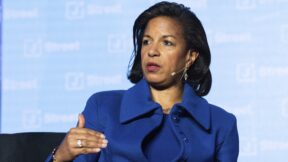
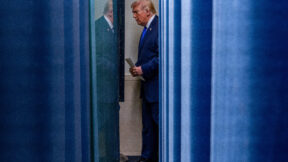
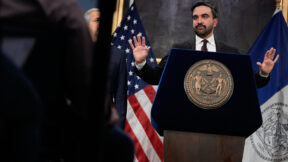
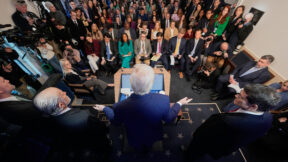


Comments
↓ Scroll down for comments ↓